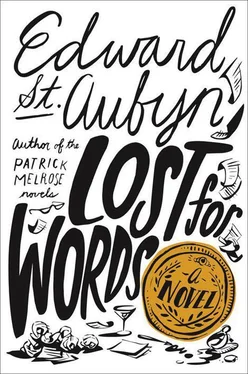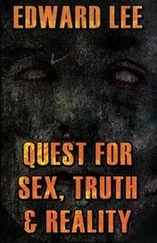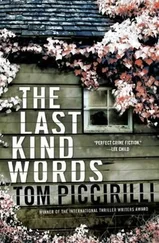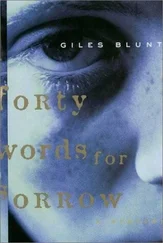At that point, something in her rebelled and, as she struggled back to her starting point at the Pont de l’Alma, she allowed herself to reflect that on a visit to a great city whose dazzling architecture was infused with the spirit of all the art and music and literature that had been made there, and was still being made there, it was important not to set one’s sights too low and end up labouring through a labyrinth of dark tunnels, up to one’s knees in rivers of shit.
Alan put down The Mulberry Elephant with a puzzled frown. As always he had looked at the last page number before reading the first word. There were two thousand more pages of this stuff. At first, he couldn’t quite believe that he wasn’t being tricked, and that the Prince wouldn’t turn out to be framed, or undermined in some way, but after skipping forward to several random passages later in the book, he confirmed that it was written entirely from the Prince’s point of view, with a wearisome emphasis on the insults dealt by modernity to the glory of the princely states, and without any hint of relief from his cloying self-regard. It was a curious object, but clearly unpublishable.
Alan left the book behind to keep a claim on his table, and then joined the queue for tea and coffee, sliding his tray towards the cash register while he put in his order for another cappuccino. He had walked across Hampstead Heath to Kenwood House with The Mulberry Elephant pulling on the straps of his rucksack. The exercise, and the long enlivening light of midsummer, had reinforced the good mood brought on by James Miller’s early call saying that IPG had decided to offer him a job. His reports on the other two typescripts had been ‘exemplary’ and the agency would be delighted to have such a senior editor on board. To celebrate the decision, he was invited to join the IPG table at the Elysian Prize dinner. Alan put down the phone with the feeling that he was back at the centre of literary life. Wanting to get shot of The Mulberry Elephant before returning to an office routine, but unable to stand the confines of his hotel any longer, he hit on the idea of spending the day in Hampstead, walking and working. Now, in less than an hour, his work was over. He had the rest of the day to himself — not the rest of his life, as he had imagined during those drunken weeks confined to his fetid hotel room, but the rest of his day, delicious because it was limited and precise.
He might not be living in the Mount Royal for the rest of his life either. Relations with his wife had taken on a more conciliatory tone. It was not his repentant emails nor her harsh replies that improved the atmosphere. It was the terrible innocence of his subsequent silence that won her over. He didn’t break off contact with her as a tactic but from pure incapacity. Even when she was trying to hate him, Marilyn couldn’t stop worrying about him. It was easy to reject his apologies but impossible to lose an interest in his whereabouts. Eventually the stronger species of emotion became entirely dominant, and Marilyn was worrying what state their marriage must have been in for Alan to defect, worrying about whether they could put the whole thing behind them, and worrying about Alan wasting money in hotels. Alan hoped that he would soon get an invitation back home but he knew that any pressure from him would delay its arrival.
The pain of his separation from Katherine, the sense that he had known something perfect and then lost it for ever, was a general numbing fact, like the strange quiet of a city early in the morning after a heavy fall of snow, but within it he could also hear, at unpredictable intervals, the hiss and the thud of a guillotine as certain details returned to his memory — the way, for instance, she had draped her arms around his neck and closed her eyes and stood a little on tiptoe to kiss him for the first time, making his enthralment look like her submission. When these images returned he had to pause if he was walking, sit down if he was standing, lie down if he was sitting, close his eyes if he was lying down, and stop breathing at all times, while he groped to deal with the fact that a fragment of his past was so much more immediate than the vaporous and destitute quality of his surroundings.
Three days ago, to his amazement, he had received a handwritten letter from Katherine. Recognizing the handwriting, he also recognized how ready he was to go back to her under any conditions; he imagined, with some embarrassment but without any doubt, the collapse of his reconciliation with Marilyn. He could have denied these impulses, since they only lasted for the few seconds between knowing that Katherine had written to him and finding out what she had written.
Dear Alan,
it began with unpromising formality.
I am writing to apologize for the mess I’ve made of things over the last year, luring you away from Marilyn and then dropping you so abruptly last month. You gave me an excuse with the fuck-up over Consequences, but I would have done it anyway. I know how to make men fall in love with me but then I don’t know what to do afterwards. That, along with my infidelities, completes the picture of what must seem to you a vile moral character.
That last sentence struck Alan as a false note. The use of two clichés in a row showed that Katherine’s conviction was faltering: the ‘complete picture’ must include many more faults than the two she was owning up to and, since she knew that he was still in love with her, it was a hidden request for him to reject the Victorian charge of ‘a vile moral character’ and overlook the very things she appeared to be underlining.
I have come to a sort of crisis about all of this, but all I can do right now is try to stop creating chaos around me, and to ask the forgiveness of the people I’ve obviously wronged, most of all you.
Lots of love,
K
‘Lots of love’ between former lovers was of course less love than ‘love’ alone. Nevertheless, he was grateful that she had not asked him to lay waste to his life a second time, knowing how eagerly he would have complied.
Back at his table, Alan took a cautious sip of his cappuccino. The letter had been salutary; there was no doubt about that. It had broken the spell of Katherine as an inaccessible object of desire on which any amount of frustration and fantasy could be expended and replaced it with a struggling human being, lost and remorseful. Its disappointing contents had helped to wash away the last traces of his romantic folly. He had always been too frightened and self-preserving to fall madly in love in adolescence, or in his twenties, and when he was finally ready to take the risk, it had all gone terribly wrong, but that, after all, was the point of romantic folly. If it hadn’t all gone terribly wrong, it wouldn’t have been the real thing. Still, it was wonderful to have got that behind him. He drained his cup of coffee and got up decisively, as if he had settled something once and for all.
Fighting his desire to leave The Mulberry Elephant behind in the cafe, he loaded the enormous volume back into his rucksack, and set off with a sense of sober elation. He walked through the gate towards the Highgate side of the Heath, and down the sloping meadow to the fountain at the foot of the hill. He scooped a few handfuls of the cold iron-rich water into his mouth, amazed by the orange streaks that stained the mud where the fountain overflowed the encrusted drain. Their screens of thick foliage made him feel he was eavesdropping on the murmuring and splashing pleasures of the bathing ponds. He turned right and cut across towards Hampstead. As he strolled down the long avenue of limes that leads to East Heath Road, his path was crossed by a dog walker, surrounded by a scattered gang of at least twenty dogs weaving their way contentedly through the woods up to the Viaduct Pond.
Читать дальше












